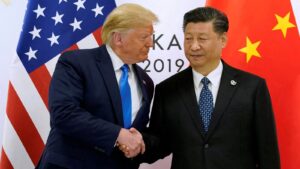|
Getting your Trinity Audio player ready...
|
Shares in Apple Inc. have taken a hit for the second consecutive day following reports of a ban on Chinese government workers’ use of iPhones. The news has raised concerns as China is the tech giant’s third-largest market, accounting for 18% of its total revenue in the previous year, and is also the primary manufacturing hub for Apple products through its key supplier, Foxconn.
TechGenez first reported on Wednesday that Beijing had issued orders to central government agency officials to refrain from using iPhones for work purposes. On the subsequent day, Bloomberg News suggested that this ban might extend to workers at state-owned enterprises and government-affiliated agencies.
Sources close to the matter have disclosed that these instructions were relayed to officials by their superiors in recent weeks. Furthermore, the ban appears to encompass other foreign-branded devices, not just iPhones, although specifics regarding the breadth of these directives remain unclear.
While certain government agencies had already imposed iPhone bans, it seems that these restrictions have now been broadened. The exact extent of this policy’s dissemination throughout the Chinese government hierarchy remains uncertain.
The timing of these reports is noteworthy, as they precede the highly anticipated launch of the iPhone 15, expected to take place on September 12.
On Chinese social media platforms, some individuals claiming to work for state-owned companies have reported being instructed to cease using Apple devices by the end of September. One individual humorously questioned, “What should I use for work?” given the financial constraints of buying a new phone.
China has consistently been one of Apple’s most significant markets, with iPhones manufactured within the country, although recent efforts have seen Apple increase production in India.
Up to this point, there has been no official statement from the Chinese government regarding these reports. Apple has also not immediately responded to a request for comment from the BBC.
The repercussions of these developments are not limited to Apple alone. The shares of some of its suppliers have also experienced declines. Qualcomm, the world’s largest supplier of smartphone chips, witnessed a more than 7% drop in its stock on Thursday. Similarly, South Korea’s SK Hynix saw its shares decrease by approximately 4% on Friday.
Tensions concerning technology have been escalating between the United States and China, with both nations imposing restrictions. Earlier this year, the United States, along with Japan and the Netherlands, imposed limitations on China’s access to certain chip technology. China responded by restricting the exports of two materials crucial to the semiconductor industry. Beijing is also reportedly preparing a new $40 billion investment fund to bolster its domestic chip manufacturing industry.
Notably, during the recent visit of US Commerce Secretary Gina Raimondo to Beijing, Chinese tech giant Huawei unveiled its Mate 60 Pro smartphone. The phone incorporates a new 5G Kirin 9000s processor developed for Huawei by China’s largest contract chipmaker, SMIC. Experts view this as a significant advancement for China’s semiconductor industry.
As the situation unfolds, US Congressman Mike Gallagher, chairman of the House of Representatives committee on China, has called on the Commerce Department to further restrict exports to Huawei and SMIC.
In a related development, Apple released an emergency software update on Thursday for numerous old and current devices in response to the discovery of a security vulnerability exploited by unknown hackers. The update was issued following findings by digital rights investigators at Citizen Lab, who identified attackers using a novel technique to compromise Apple devices.
This marks the 15th time this year that Apple has issued extensive security updates, emphasizing the ongoing importance of cybersecurity in the tech industry.
This story is developing, and further updates will be provided as new information emerges.



